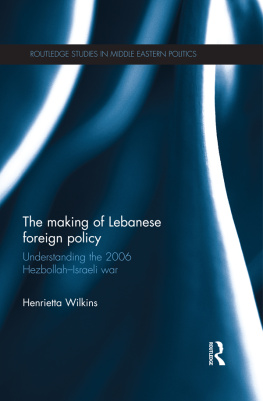
Joseph Bayeh is an assistant professor at the University of Balamand, Lebanon. He holds a PhD in Political Science from the University of Exeter.
Bayeh provides worthy insights about re-reading Middle East politics, with special reference to Lebanon, through an international relations lens with the added benefit of case study analysis, for the purpose of highlighting the relevance of specificity. In so doing, local geography, history and political dynamics are filtered lucidly through global and international meddling and interventionist policies which inevitably entangle Lebanon to the big-power game past and present. His book on stability and change in Lebanon is a must read for students of local political dynamics conditioned by international atmospherics.
Larbi Sadiki, Professor of International Relations, Qatar University
A HISTORY OF
STABILITY AND
CHANGE IN
LEBANON
Foreign Interventions and International
Relations
J OSEPH B AYEH

To my parents,
Nicolas Bayeh and Nour Fayad,
to whom I owe whatever success in this life...
Published in 2017 by
I.B.Tauris & Co. Ltd
London New York
www.ibtauris.com
Copyright 2017 Joseph Bayeh
The right of Joseph Bayeh to be identified as the author of this work has been asserted by the author in accordance with the Copyright, Designs and Patents Act 1988.
All rights reserved. Except for brief quotations in a review, this book, or any part thereof, may not be reproduced, stored in or introduced into a retrieval system, or transmitted, in any form or by any means, electronic, mechanical, photocopying, recording or otherwise, without the prior written permission of the publisher.
References to websites were correct at the time of writing.
Library of Modern Middle East Studies 175
ISBN: 978 1 78453 097 6
eISBN: 978 1 78672 232 4
ePDF: 978 1 78673 232 3
A full CIP record for this book is available from the British Library
A full CIP record is available from the Library of Congress
Library of Congress Catalog Card Number: available
CONTENTS
INTRODUCTION
It's all the Italians' fault.
It's conceived in China and born in Lebanon.
These two popular proverbs reflect the popular awareness, if not conviction, that changes in Lebanon are often determined by events outside its reach. Indeed, during its pre-state political incarnations (emirate, kaymakamate and mutessarifate), as well as during its modern republic system, most changes in Lebanon have arguably been linked to external factors in one way or another. Whether changes in its structure or stability, or the occasional occurrence of war, political developments in Lebanon have rarely been independent of conditions outside its realm.
This popular belief has, however, never before been put to academic test. Although some literature mentions external (international and regional) determinants for change in Lebanon, no empirical study exists that incorporates a theoretical linkage between such external factors and changes in the country. In particular, there is a failure in the literature on political developments in Lebanon to determine conclusively the predominant effectors of change in the country that is, whether domestic, regional or international dynamics are the main determinants of change in the structure and stability of Lebanon, and the linkages between those different dynamics and change.
To fill this void in the extant literature, this book will study the long-term relationship between the international system and Lebanon. The book will investigate and establish the myriad links between changes on the international level and changes in the structure and stability of Lebanon, and, in so doing, will demonstrate that the country's structures and stability are mainly determined by factors on the international level.
In fact, it is assumed here that divided states positioned in volatile regions display a unique political dynamic. When such polities become the object of rivalry and contestation between major international powers, those states are more vulnerable to dynamics on the international level than to regional or domestic ones.
This theoretical assumption enables better interpretation of systemic effects and their consequences on the structure and stability of Lebanon. Theorising allows us to derive meaningful patterns from the complex domain of international relations. In the case of Lebanon, this task becomes an even more urgent priority for the purpose of policy making foreign and domestic.
It is almost certain, however, that the relevance of this work stretches beyond the confines of Lebanese politics and history. What applies in the case of Lebanon may serve academics and lay readers alike to understand similar cases around the world and, possibly, across history.
Broadly speaking, the literature on Lebanon can be divided into three categories: historical works; discussion of change from a regional perspective; and systemic-oriented works, which usually try to link the dynamics of the international system to changes in Lebanon.
The second of these literature categories, which attributes changes in the structure and stability of Lebanon to regional factors, can therefore be seen as the antithesis of the argument put forward by this book. That is not to downplay the importance of innate or regional dynamics in explaining change in structure and stability in Lebanon, but rather to demonstrate that, in many instances, systemic effects are the primary accountable source of that change.
Of course, no single level of analysis tells the complete story of change in Lebanon. A full understanding of any period of the country's history necessarily requires recourse to determining variables on the local, regional, and international levels.
In general, however, the major deficiency in all of the above- mentioned literatures is that they study a specific issue or change that occurred in Lebanon. Thus, they are fragmented or short-term studies, most of whose authors adopted a micro-level analysis. Conversely, this book will investigate the relationship between the international system and changes in Lebanon over a long period from a macro level, which will cover all the relevant structural and stability changes in the modern history of the nation: the 1770 shift from Muslim to Christian emirates, the 18412 War, the 1842 kaymakamate system, 1920s Greater Lebanon, independence in 1943, the 1958 Crisis, the 1975 War, the Second Republic (1990), the 2005 Syrian expulsion and the restoration of political autonomy. The significance of this macro analysis is its ability to enable comparisons over different time segments and to figure out patterns of systemic effects on changes in Lebanon or a pattern that describes the relationship between Lebanon and the international system.
A divided state like Lebanon may be especially vulnerable to outside factors because of its smaller size and power relative to its neighbours or because of its location in a strategic region, which makes it tempting for greater systemic powers to interfere in its affairs. Other domestic factors also render a state more susceptible to outside intervention mainly, a lack of consensus on national identity or the adoption of misguided policies that alienate a state from its surrounding environment, rendering it more vulnerable to external aggression.
Most of the literature on Lebanon invests generously in an elaborate description and analysis of the country's divided nature and the impact of this on Lebanon's political developments especially on the issue of instability and the occurrence of conflict.
Next page














